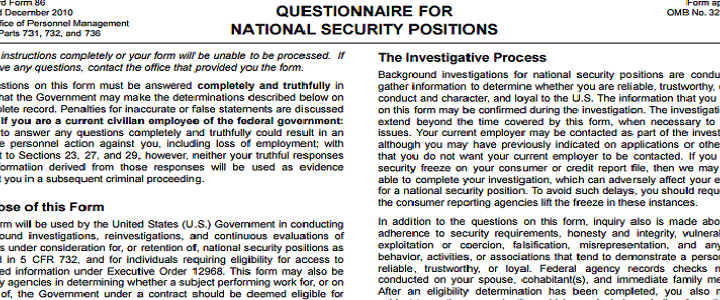For an overwhelming majority of security clearance holders, completing the SF-86 form is a mundane, albeit tedious, task. But for a few of you with more colorful lives, things can get complicated when asked to provide a detailed accounting of areas like your employment history and foreign contacts in an unclassified setting.
To be clear, the SF-86 is just that: an unclassified setting. Much like the government’s “USAJobs” website, where applicants submit resumes for civil service positions, the e-QIP system used to submit SF-86s is not set up to handle classified information. Applicants who list classified information on the SF-86 will actually have committed a security violation that could be grounds for denial or revocation of clearance.
Nonetheless, the SF-86 is also signed under penalty of criminal prosecution for false statements. Applicant’s should be rightfully leery of signing a knowingly falsified official document – even if the falsification was something condoned and facilitated previously by a government agency in a different context.
How can I be thorough and honest on my SF-86 without revealing classified information?
It can be challenging to reconcile these two issues where truthfully answering a question on the SF-86 requires a classified response. The government doesn’t exactly make such situations easy to navigate and few personnel security officials are adequately versed in how to handle one.
The opinion of this attorney, and the general consensus among my colleagues both in and outside of government, is that – absent explicit and written advice from a federal agency to the contrary – a security clearance applicant must never provide a false answer on the SF-86. Instead, the applicant should decline to respond to the question at all and instead prominently annotate the SF-86 with something along these lines:
“Question ____ requires an answer that is, or I reasonably believe may be, classified. I cannot answer the question in this space, however I will be happy to discuss the matter further in a classified setting with appropriately cleared individuals.”
Ultimately, this is a situation where threading the needle carefully protects both the government’s interests in avoiding a spill of classified information and the applicant’s interests in avoiding legal jeopardy for a false official statement (however unlikely that may be under the circumstances).
Handling such a matter with discretion also demonstrates some of the very attributes the government seeks in those entrusted with classified information.
This article is intended as general information only and should not be construed as legal advice. Consult an attorney regarding your specific situation.




